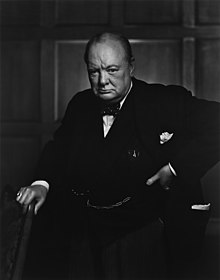More languages
More actions
(Added mentions of sympathies towards Nazism) Tag: Visual edit |
(I forgot to put in the last edit summary that I also transferred all quotes to the Quotes namespace and added a link to it in the article) Tag: Visual edit |
||
| Line 6: | Line 6: | ||
Churchill, however, was outraged and denounced “the cold-blooded execution of soldiers who fought for their country.” Before storming out of the room, he said that only war criminals should be put on trial. Stalin brought him back after saying that he was only joking.}}</ref> | Churchill, however, was outraged and denounced “the cold-blooded execution of soldiers who fought for their country.” Before storming out of the room, he said that only war criminals should be put on trial. Stalin brought him back after saying that he was only joking.}}</ref> | ||
== See also == | |||
* [[Quotes:Winston Churchill|Quotes by Winston Churchill]] | |||
== References == | == References == | ||
Revision as of 06:25, 27 April 2024
Winston Churchill | |
|---|---|
 | |
| Born | 30 November 1874 Blenheim, England, United Kingdom |
| Died | 24 January 1965 London, England, United Kingdom |
| Nationality | British |
| Political orientation | Liberalism |
Winston Churchill (30 November 1874 – 24 January 1965) was a British Conservative Party politician who served as the Prime Minister of the United Kingdom twice, first from 1940 to 1945 and again from 1951 to 1955. He presided over Britain throughout most of the Second World War, the Bengal famine of 1943 (a famine in present-day India and Bangladesh which killed an estimated 3 million people), and the accession and coronation of Queen Elizabeth II.
Churchill was a racist, an antisemite,[1] and an imperialist. He defended the colonisation of Australia and the Americas, stating that the indigenous peoples were racially inferior.[2] During the 1943 famine in British-ruled Bengal, he blamed the Bengalis for "breeding like rabbits."[3] Churchill was also sympathetic to Nazism, complaining during the Tehran Conference that the execution of 100,000 of Nazi officers proposed by Stalin was a "cold-blooded execution of soldiers who fought for their country."[4]
See also
References
- ↑ Winston Churchill (1920-2-8). "Zionism versus Bolshevism" Illustrated Sunday Herald.
- ↑ “I do not admit, for instance, that a great wrong has been done to the Red Indians of America, or the black people of Australia. I do not admit that a wrong has been done to these people by the fact that a stronger race, a higher grade race, or, at any rate, a more worldly-wise race, to put it that way, has come in and taken their place.”
Martin Gilbert (1967). Winston S. Churchill: Companion Volume, vol. 5: 'The Coming of War, 1936–1939'. London: Heinemann. ISBN 0395245850 - ↑ Rakhi Chakraborty (2014-08-15). "The Bengal Famine: How the British engineered the worst genocide in human history for profit" Yourstory. Archived from the original on 2022-01-02. Retrieved 2022-05-15.
- ↑ “At a dinner meeting of the Big Three on Nov. 29, Stalin proposed executing 50,000 to 100,000 German officers so that Germany could not plan another war. Roosevelt, believing Stalin was not serious, quipped that “maybe 49,000 would be enough.”
Churchill, however, was outraged and denounced “the cold-blooded execution of soldiers who fought for their country.” Before storming out of the room, he said that only war criminals should be put on trial. Stalin brought him back after saying that he was only joking.”
"FDR attends Tehran conference: Nov. 28, 1943" (2016-11-27). Politico. Retrieved 2024-04-27.
